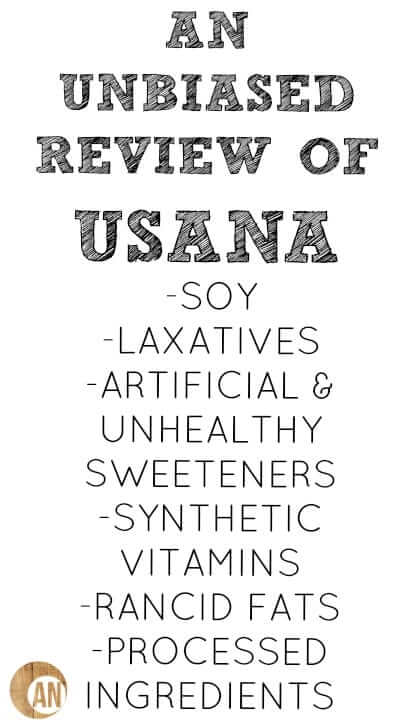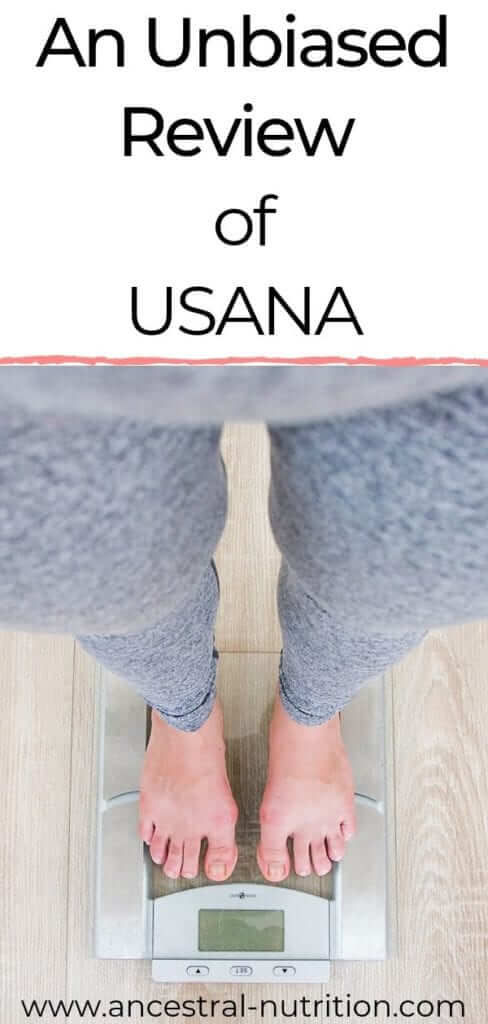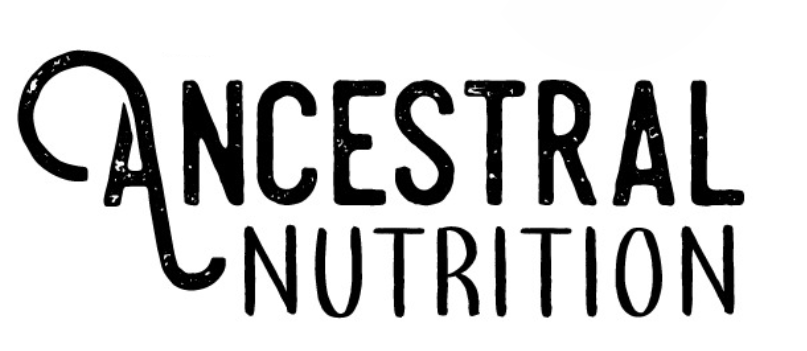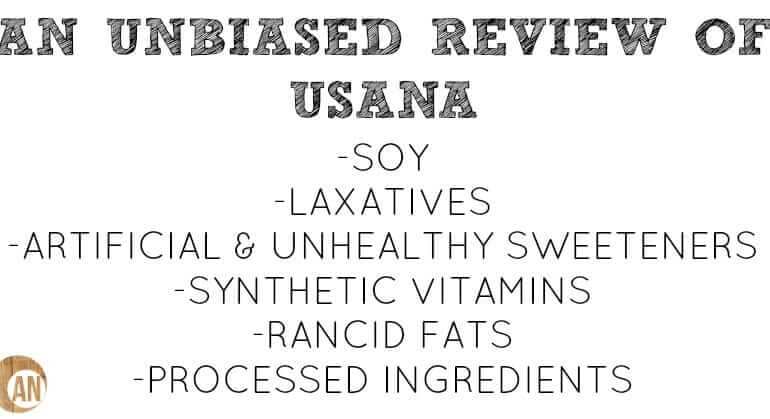This Usana review covers all your questions: how effective are Usana products, do they work, and are they worth the money? Learn about the ingredients used in Usana products and find out about potential side effects.
Before it’s asked, this is the protein I use and recommend. I couldn’t find one good enough on the market, so I made my own. Grass-fed collagen with six organic superfoods: kale, spirulina, wheatgrass, broccoli, spinach and turmeric. I drink it in my daily smoothies and it gives me LIFE. Aka a healthy gut, glowing skin, strong digestion and energy for DAYS.
So, you asked me for an honest review of Usana products:
At this point, I’m not sure why people even ask me to do an unbiased Usana review or any other products containing garbage ingredients like soy.
I will never recommend meal replacements, processed food, artificial sweeteners or any other junk that’s passed off as health. And Usana lovers, I hate to break it to you (just kidding, I love getting the truth out there) – Usana’s products contain unhealthy, overly processed trash.
Let’s take a look.
What is Usana?
Usana is one of the largest health and wellness network marketing companies out there. This company produces over 50 products ranging from dietary and nutritional supplements to personal care products.
The word Usana is apparently a blend of Greek and Latin and is supposed to stand for “True Health”. EU means true and SANA means health. Ok, let’s look at their definition of true health.
Usana Products Review:
Peanutty Delite
 Vanilla Nutrimeal
Vanilla Nutrimeal

Nutrimeal Chocolate Whey
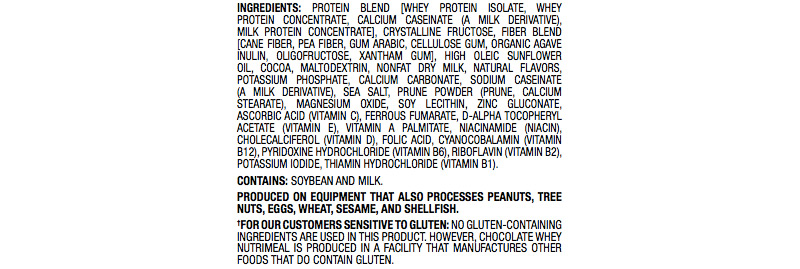
Fudge Delite

I have questions for you, Usana:
After taking a look at some of the ingredients used in Usana products, I had a few very basic questions for Usana:
- Is they whey grass-fed?
- Where is it sourced from?
- How is it processed?
- Are your products certified GMO free?
So I shot them an email and waited. And waited. Over a week. Then I decided to just call customer service.
Is Usana wey grass-fed?
My first very basic question was if the whey they use is grass-fed.
“Is it what?”
Grass-fed.
Silence.
“Is the whey sourced from grass-fed cows?”
While the customer service agent was very nice, it was clear she had no idea what I was talking about. After placing me on an extended hold, they let me know this was a question for their scientists.
Seriously?! This is the most basic question and the customer service agent doesn’t even know what it means? The scientist have to be consulted? They told me that I was the first person to ever ask this question. Seriously, I find this both disconcerting and completely nuts.
So I took to Facebook to ask if they’re certified GMO free and if they’re grass-fed.
It took them two weeks to respond to me with this very convoluted answer:
USANA is dedicated to selecting the purest and safest ingredients for our products. As part of our efforts to do so, we adhere to non-GM (genetically modified) testing standards for raw materials in our global markets. These compliance standards include sourcing non-GM materials such as Non-GMO Soy Protein, Identity-Preserved Soy Isolate, Non-GM Pea Protein, and many others.
Through continuous product testing, USANA has determined our products free of genetically modified organisms (GMOs). We have also sent our products to accredited third-party laboratories to validate our testing and detection methods for bioengineered DNA.
USANA will continue to be vigilant in our testing for new GMOs as they are identified. A “zero” level of bioengineered material cannot be implied in any claim of GMO-free, as there is always potential for adventitious bioengineered material.
So in short – they are not certified GMO free but they apparently do try to source non-GMO options. But without that certified GMO free label, I don’t trust it.
Notice they didnt’ respond to the grass-fed question? So I asked again on March 11th. It’s March 27th today so I’m going to go ahead and guess that they don’t use grass-fed whey. If you have more info, please let me know.
Let’s review the ingredients in Usana products.
Soy Protein
To make soy protein, first the oil must be extracted. To do this, soy undergoes an insane amount of processing. This includes the use of hexane – a neurotoxin.
It is subjected to extremely high temperatures, then deodorized because it smells disgusting. Finally they bleach it because it’s a weird gray color. Then marketing execs convince people that this cheap, unhealthy commodity crops is a healthy food to consume.
And I haven’t even addressed the fact that soy is extremely high in phytoestrogens which interfere with proper hormone production (source).
Or that this study from Harvard found that men consuming the equivalent of one cup of soy milk per day had 50% lower sperm count than men who did not consume soy (even accounting for other factors like age, caffeine and alcohol intake, etc.).
From the study,
There was an inverse association between soy food intake and sperm concentration that remained significant after accounting for age, abstinence time, body mass index, caffeine and alcohol intake and smoking. In the multivariate-adjusted analyses, men in the highest category of soy food intake had 41 million sperm/ml less than men who did not consume soy foods.
Whey Protein
Normally, I’m a fan of whey protein, but only when it’s grass-fed and has undergone a minimal amount of processing. Like in the protein powders I personally use and recommend found here and here.
However, when consuming any whey or dairy product from cows that have not been grass-fed, you are essentially consuming the GMOs they have been fed. Whey from conventional cows is also much higher in omega-6 and much lower in omega-3, which causes inflammation.
And inflammation is at the root of any disease.
Sorbitol
Sorbitol is an artificial sweetener that can also be used as a laxative. According to this website, here is a partial list of side effects:
- severe stomach cramps;
- vomiting;
- severe diarrhea;
- rectal bleeding;
- black, bloody, or tarry stools;
- weakness, dizziness; or
- frequent urge to have a bowel movement.
Maltodextrin
Maltodextrin is a processed food addictive usually derived from genetically modified corn.
Crystalline Fructose
Crystaline fructose is another processed sweetener derived from corn. Fructose is one of the most harmful sweeteners that can be consumed, it’s even worse than sugar.
Whereas other sugars are converted to glucose, fructose is exclusively processed by the liver and converted into triglycerides (source). This is why it raises triglycerides and LDL (the “bad” cholesterol). It’s also been linked to fatty liver disease.
This study from Emory University School of Medicine concluded that,
Growing evidence suggests that fructose contributes to the development and severity of NAFLD. In human studies, fructose is associated with increasing hepatic fat, inflammation, and possibly fibrosis. Whether fructose alone can cause NAFLD or if it serves only as a contributor when consumed excessively in the setting of insulin resistance, positive energy balance, and sedentary lifestyle is unknown. Sufficient evidence exists to support clinical recommendations that fructose intake be limited through decreasing foods and drinks high in added (fructose-containing) sugars.
Folic Acid
Folate is found in foods and is absolutely necessary to human health. Folic acid, however, is the synthetic version that has been linked to cancer.
…in the Journal of the American Medical Association — suggesting that all the extra folic acid might increase your odds of developing cancer. “The more we learn about folic acid, the more it’s clear that giving it to everyone has very real risks,” says folic acid researcher David Smith, PhD, a professor of pharmacology at the University of Oxford in England.
Another study out of Chile linked folic acid supplementation with an increased risk of colon cancer.
And yet another study out of Norway linked folic acid supplementation with a 21% increase in lung caner.
Folic acid and B12 supplementation was associated with a 21% increased risk for cancer, a 38% increased risk for dying from the disease, and an 18% increase in deaths from all causes. (Source)
While folate is a necessary part of a healthy diet, folic acid has actually been linked to increased rates of cancer (another source for ya).
Conclusion of this Usana Review
Let’s come back to the questions we started out with? Are Usana products effictive? Are they worth the money.
I’ve said it a thousand times before and I’ll say it a thousand times again. There is no quick fix to a healthy lifestyle or weight loss. No, there are no magic meal replacements, pills or protein powders that will do for you what a healthy diet does.
Eat the food and eat well. Enjoy food. It’s meant to be enjoyed.
Don’t fall for diet products like this, that tout a laundry list of benefits but with ingredients that read like junk food. This is not health, nore is it long-term. Usana is not the solution for your weight problem and definitely not worth your money.
For more reviews, check out my:
